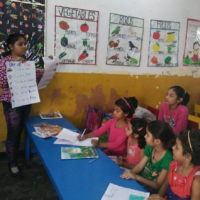CHANGE leaders do great things, and often that is all we know about them. Here we want to get a different glimpse of the personalities that constitute the development space. Every month we get one leader to answer four questions, not necessarily about their work, but about themselves. This week we catch up with Ankit Manchanda, co-founder of Guzarish.
Ankit Manchanda gets his passion to do something good for society from his father who engaged in social service for more than 30 years. “He taught me to help people whenever we have enough and that thought is embedded in my mind,” he says.
So after Ankit finished his MBA and got a job, he found the opportunity to act on that thought when he met Prachi Luthra, a Teach For India fellow. She spoke about the condition on the ground at government schools and the lack of books. She was raising funds to buy books that cost at least ₹200 to ₹300 each.
It was then that Ankit had an epiphany. “There are people like us who have a lot of books lying on our shelves and there are many others who don’t have access to these books so I thought why can’t we create a much needed bridge?” And that’s how Guzarish was born.
Started in 2015 by Ankit and his friends, Jaibeer Singh, Prachi Luthra, and Sanymi Gupta, Guzarish through their initiative ‘Books For All’ aims to ensure underprivileged kids have access to books. Their main beneficiaries are children studying in government schools. “Many of these children have the passion to read but they can’t afford books. Guzarish works towards addressing this challenge,” Ankit says.
Small Change: Why does this cause matter to you?
Ankit Manchanda: When I spoke to Prachi I realised that books help students engage better in classes. Children need some kind of motivation to come to school. Storybooks catch their attention so we wanted to make sure storybooks become a part of their life in school.
Gradually we also realised that even though the government says they are providing academic books, they reach the kids only in August while the school starts in April or May. As these children can’t afford books, they have to study without books in the first three months.
Also, the kids who are preparing for entrance exams such as IIT-JEE need books that are quite expensive. By providing these books at affordable prices to these kids, we wanted to make sure their path to success isn’t blocked by the lack of access to such books.
SC: Often we talk about making books accessible to underprivileged children but the thought remains limited to textbooks. Why do you feel we need to include books that are beyond their curriculum?
AM: Often textbooks don’t catch the attention of young kids. It’s the storybooks that do. They come to school because they want to read those books.
Once they start reading, they understand the world beyond theirs. And their world is a very different world so it’s important for them to have that exposure. They also become more creative. Reading fiction helps them develop their imaginative power, teaches empathy and engages them in the school curriculum. For instance, if you teach a kid a concept through a story, they will remember it. That’s the power of stories.
SC: What has been the most uplifting part of this journey?
AM: We ask the kids to send us a short review when they finish reading a book. Sometime back we got a review from a girl studying in Class 6 who read a book that compared Mahatma Gandhi and Bhagat Singh. She wrote about how both of them were very different but both played a crucial role in India gaining independence. And I thought when I was in Class 6, I couldn’t have written that or even thought of it!
It’s motivating to see these kids come up with such deep insights.
Also, when children message and thank us for giving them an important entrance exam book at an affordable price and tell us they did well in the exam because of that, that warms my heart.
SC: If you have been forced to eat only four things for the rest of your lives, which items would you choose?
AM: Being a Punjabi kid, I have always loved rajma chawal and everyone knew about it. So when I was a kid, if any of my relatives made rajma chawal, even if they lived 10km away, they would send it for me. Every week, I would get to eat it twice or thrice.
So, I would definitely choose rajma chawal, momos, gobi parantha and Ice cream.
-Interview by Aisiri Amin
Guzarish are currently running a fundraiser to distribute 1 lakh books every year to children who can’t afford to buy them. You can contribute to it here.
Discover more from give.do
Subscribe to get the latest posts to your email.



